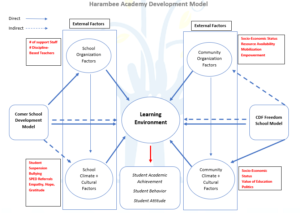Overview & Vision
Overview
In the Swahili language, Harambee means “all pull together”. As the national motto of Kenya, Harambee symbolizes a proud tradition of neighbor helping neighbor – communally lifting each other up. This is the philosophy underpinning Harambee Academy.
Vision
Our vision is to close the educational achievement gap between high- and low-income students in North Huntsville and to develop youth who are critical thinkers and lifelong learners with the academic preparation and personal character to be responsible citizens who can address the growing issues of the 21st century.
Our approach and the models that guide us underscore the philosophy of Harambee that is needed to achieve our vision.
Our Approach
Through Harambee Academy we take a two-prong approach to educating children that is both holistic and place-based.
The Holistic Approach
The holistic approach is an approach that affirms the idea that each Scholar finds identity, meaning, and purpose in life through the connections they make to the community, the natural world, and to humanitarian values such as compassion and peace. This approach aims to develop in Scholars an intrinsic reverence for life and a passionate love of learning.
Holistic education examines the whole Scholar and focuses not only on academic performance but also their well-being, health and spirituality. Therefore, our holistic approach pays primary attention to the experiential learning of Scholars and the significance this has on relationships and primary human values within the learning environment. As such, the learning environment is not confined to the school, but encompasses every facet of Scholar’s lives in their community through a synergism that impacts the total being of the child.
The Place-Based Approach
With an emphasis on the learning environment as community, our approach is also place-based in that we seek to take advantage of Scholars’ immersion in local heritage, cultures, landscapes, opportunities and experiences and use these as a foundation for authentic, meaningful and engaging personalized learning for our Scholars.
We ultimately believe that such an approach to education guides systemic change in the community as the community leads its own uplift using its own social capital.
Theory of Change Model

